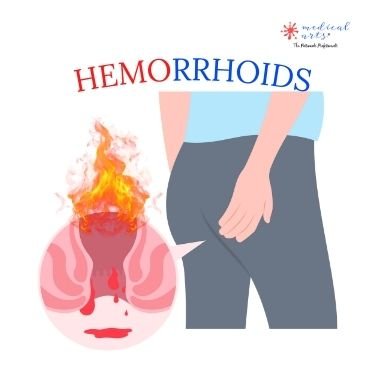Understanding Hemorrhoids: Symptoms, causes and treatment.
Introduction
Hemorrhoids, also known as piles, are a prevalent condition affecting millions of people worldwide. Despite their frequency, they remain a sensitive topic many individuals hesitate to discuss. This guide aims to shed light on the causes, symptoms, and treatment options for hemorrhoids.
What Are Hemorrhoids?
Hemorrhoids are swollen and inflamed veins in the rectum and anus that can cause discomfort, itching, and bleeding. They are categorized into two primary types:
- Internal Hemorrhoids: Located inside the rectum and usually painless, they may bleed.
- External Hemorrhoids: Found under the skin around the anus and can cause significant pain and discomfort.
Grading of Hemorrhoids
Internal hemorrhoids are often classified based on the severity of their prolapse:
- Grade 1: No prolapse; present inside the rectum.
- Grade 2: Prolapse upon straining but retracts spontaneously.
- Grade 3: Prolapse upon straining and requires manual reduction.
- Grade 4: Irreducible and remains prolapsed.
Will hemorrhoids go away on their own?
Many mild hemorrhoids resolve spontaneously with lifestyle adjustments, such as eating more fibre, staying hydrated, and avoiding prolonged sitting on the toilet. However, persistent or severe cases may require medical attention for quicker relief and to prevent complications.
What are the main causes of hemorrhoids?
While the exact cause of hemorrhoids remains unclear, they are primarily caused by increased pressure in the rectal area due to:
- Chronic Constipation or Diarrhea: Straining during bowel movements can increase pressure on rectal veins.
- Pregnancy: The pressure from the growing uterus and increased blood flow can enlarge veins in the rectal area.
- Obesity: Excess weight can add pressure to rectal veins.
- Prolonged Sitting or Standing: Remaining in one position for long periods can hinder blood flow.
- Aging: Tissue in the rectal area becomes weaker with age.
-
Diet: A low-fiber diet is a common contributing factor.
Symptoms
The symptoms of hemorrhoids can vary based on the type and severity but generally include:
-
Internal Hemorrhoids:
- Painless rectal bleeding (bright red blood on stool or toilet paper)
- Prolapse (hemorrhoid protruding from the anus)
-
External Hemorrhoids:
- Anal itching or irritation
- Pain or discomfort, especially while sitting
- Swelling around the anus
- Bleeding (if the hemorrhoid is thrombosed)
Diagnosis
Medical professionals typically diagnose hemorrhoids through:
- Physical Examination: Inspecting the anal area for external hemorrhoids or a prolapsed internal hemorrhoid.
- Digital Rectal Exam (DRE): Feeling for abnormalities inside the rectum.
- Anoscopy/Proctoscopy: Using a small tube to inspect internal hemorrhoids.
- Sigmoidoscopy/Colonoscopy: Recommended if the patient has significant bleeding to rule out other conditions.
Treatment Options
1. Conservative Treatments
- Dietary Changes: A high-fibre diet and increased water intake can help soften stool and reduce straining.
- Over-the-counter (OTC) Medications: Creams, ointments, and suppositories containing hydrocortisone or witch hazel can provide temporary relief.
-
Can you use Polysporin on hemorrhoids?
Polysporin can provide temporary relief for irritated skin near hemorrhoids but does not treat the root cause. Use it with gauze after gently cleaning the area. For more effective results, rely on hemorrhoid-specific treatments. -
Sitz Baths: Soaking the anal area in warm water for 10-15 minutes 2-3 times a day can alleviate discomfort.
-
Will Vaseline help hemorrhoids go away?
Vaseline (petroleum jelly) does not treat hemorrhoids directly but can provide a protective barrier to reduce irritation and friction. Apply a small amount to the anal area to soothe symptoms, but pair it with other treatments for faster recovery. -
Does Preparation H shrink hemorrhoids?
Yes, Preparation H contains Phenylephrine HCl, a vasoconstrictor that reduces swelling of hemorrhoid tissue. Additionally, its mineral oil and petrolatum ingredients help soothe itching, burning, and discomfort for temporary relief.
2. Medical Procedures
- Rubber Band Ligation: Placing a rubber band around the base of an internal hemorrhoid to cut off its blood supply, causing it to shrink and fall off.
- Sclerotherapy: Injecting a chemical solution into the hemorrhoid to shrink it.
- Infrared Coagulation: Using infrared light to coagulate blood vessels reduces hemorrhoids.
- Hemorrhoidectomy: Surgical removal of large or severe hemorrhoids.
- Stapled Hemorrhoidopexy: Stapling the hemorrhoid back into place is often less painful than traditional hemorrhoidectomy.
3. Lifestyle Modifications
-
Is walking good for hemorrhoids?
Yes, moderate physical activity like walking strengthens rectal supportive tissue and improves blood flow, reducing inflammation. Walking 20-30 minutes daily can stimulate bowel function, preventing constipation and promoting healing. - Regular Exercise: Encourages bowel regularity and reduces pressure on rectal veins.
- Avoiding Straining: Don't delay bowel movements; avoid sitting for prolonged periods.
-
What not to drink when you have hemorrhoids?
Avoid drinks that can irritate hemorrhoids or worsen constipation, such as:- Caffeinated beverages (coffee, tea).
- Alcohol, which dehydrates the body.
- Instead, drink plenty of water to soften stools and support smooth bowel movements.
Prevention Strategies
- High-Fiber Diet: Incorporating whole grains, fruits, and vegetables into the diet can prevent constipation.
- Stay Hydrated: Drinking plenty of fluids aids digestion and stool softening.
- Exercise Regularly: Regular physical activity promotes healthy bowel movements.
- Good Bathroom Habits: Avoid straining and don't delay bowel movements.
What not to do when you have hemorrhoids?
To avoid worsening hemorrhoids:
- Do not sit on the toilet for long periods. Limit bathroom time to 5-10 minutes.
- Avoid aggressive wiping; instead, use moist wipes or gentle cleaning techniques.
- Avoid heavy lifting or activities that strain your rectal area.
- Don’t ignore persistent symptoms; seek medical advice if bleeding or pain continues.
Can stress cause hemorrhoids?
Stress does not directly cause hemorrhoids but can trigger behaviours that lead to them, such as:
- Poor eating habits (low fibre intake).
- Disrupted bowel movements (constipation or diarrhea).
- Increased abdominal pressure from straining.
- Managing stress through healthy habits can help prevent flare-ups.
When to See a Doctor
While hemorrhoids can often be managed at home, medical attention should be sought if:
- Rectal bleeding is significant or persistent.
- Symptoms persist or worsen despite treatment.
- There is severe pain or discomfort.
- Changes in stool colour, consistency, or bowel habits.
- Symptoms that do not improve after one week of home care.
- Rectal bleeding should always be evaluated to rule out other serious conditions.
Conclusion
Though common and often uncomfortable, hemorrhoids can usually be managed with a combination of lifestyle changes, conservative treatments, and medical procedures. By understanding the causes, recognizing symptoms, and seeking appropriate treatment, individuals can effectively address this condition and improve their quality of life.

